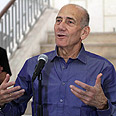
The public debate surrounding the possibility that Ehud Olmert, Aryeh Deri and their ilk will return to political and public life in the State of Israel evokes melancholy reflections, also about our very existence. The heated discussions on the issue of moral turpitude and whether seven years have past or have not past since the conviction are completely irrelevant and unnecessary.
In my humble opinion, a person who has been convicted of a criminal offense has no place in public life. It's as simple as that. Regardless of whether the offense involved moral turpitude or whether the criminal was slapped with a fine or handed a suspended sentence, and even if our only hope of ever achieving peace with our neighbors depends on the guilty party's unique abilities – he or she still has no place in public life. Unfortunately, most of Israel's elected officials were not blessed with many talents or exceptional qualities, so they should at least be honest and uncorrupt.
As far as I know, in civilized countries overseas, like the US and Britain, public figures who did not serve any time and were accused of transgressions that are much less severe – such as having a mistress or using the services of a call girl – resigned from their posts immediately and never returned to politics. I don't recall John Profumo asking to return to his post as British secretary of war or Gary Hart running for president again, and I don't believe Eliot Spitzer will ever ask to run for governor of New York State again.
Apparently, the civilized nations of the world conform to the basic social norm according to which those who sinned are never heard from again.
But in Israel, it sometimes appears that the safest path to political life passes through the courts and that a conviction serves as a sort of entry pass to a successful political comeback. Look at Olmert, Tzachi Hanegbi, Deri and Haim Ramon. Those who consider these men to be the only ones who can bring Israel peace are sorely mistaken. During Olmert's tenure as prime minister we experienced were two bloody wars, and despite what some leftists tend to think, Deri is apparently not the one who will tip the scale in favor of signing a peace agreement.
The argument that these people have "paid their debt to society" is far from being convincing. From a narrow legal standpoint they have, but they will never pay the price for abusing the public's trust and for their corrupt and deceitful ways while holding positions of power. Such criminals can certainly put their exceptional skills to use in various fields in the public sector, but their way back to politics is blocked!
If we don't act now, what will happen when the convicts Moshe Katsav and Avraham Hirchson, after paying their debt to society, will want to resume their political life?
Amnon Strashnov served as a judge in the Tel Aviv District Court















